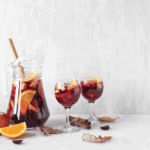Most of us make an effort to limit our consumption of alcoholic beverages when on a health journey.
This is because alcohol in any form is known to have some adverse health effects, from dehydration to increased systemic inflammation.

However, there will be situations (such as celebratory occasions or social gatherings) where you might want to enjoy a glass or two of wine.
In these moments, it’s best to know which types of alcoholic drinks are healthier than others so you can make the most sensible choice.
One question we get a lot from people who are trying to take care of their health is: ‘Is sangria or wine healthier?’
To find out whether wine or sangria is the healthier choice, read this article. We’ll be looking at the health benefits and drawbacks of sangria compared to wine
Sangria Vs. Wine: What’s The Difference?
Firstly, before we can start comparing sangria and wine from a health perspective, it helps to know what actually differentiates one beverage from the other.
Sangria is not the same as wine, but wine is the main ingredient in sangria.
The main difference between wine and sangria is that in addition to wine, sangria contains some form of non-alcoholic mixer, liqueur, and fruit as well as a sweetener such as nectar or syrup.
Health Benefits And Drawbacks Of Sangria
A mixture of wine, liqueur, and soda might not sound like the healthiest drink in the world, but recent research has actually demonstrated that sangria has a few benefits for your health.
First of all, because sangria is traditionally made with red wine, it contains lots of antioxidants as well as flavonoids and polyphenols.
These nutrients help to reduce inflammation in the body, and flavonoids in particular have anti-aging effects. Because it also contains pieces of fruit (namely, citrus fruit) sangria is also high in vitamin C.
If you’ve ever tried sangria, you’ll know that it tastes quite sweet. However, you can make sangria with refined-sugar-free syrups such as agave syrup, and you can use a sugar-free mixer such as diet soda.
So, you don’t necessarily need to worry about consuming lots of refined sugar when you drink sangria.
Additionally, sangria’s red wine content may help to improve your heart health and protect against eye problems and even hearing loss! The antihistamine and antibacterial properties of red wine are also benefits of sangria.
However, even if you make sangria using sugar-free soda and sugar-free syrup, the average glass of sangria will still contain 16 grams of sugar due to the fruit in the drink.
This means that sangria may not be a suitable choice of beverage if you are living with diabetes or are trying to stick to a low-carb diet. If you’re trying to lose weight, the extra sugar in sangria may get in the way of your goals.
Sangria also contains more alcohol than your average glass of wine. That’s because it also contains liqueur.
While the difference in alcohol content between sangria and wine isn’t huge, it’s worth bearing in mind if you know that alcohol affects you a lot, especially since it’s easy to consume a fair amount of sangria without realizing because it’s so delicious and fruity.
How Does Wine Compare?
Since wine (specifically, red wine) is the main ingredient in sangria, these two beverages have some of the same health benefits.
All of the health benefits seen in sangria that are associated with red wine can be derived from drinking red wine by itself.

For example, drinking red wine in moderation may have benefits for your heart. In particular, it might protect against coronary artery disease. Due to its antioxidant content.
Red wine, when consumed occasionally, might even help to regulate your blood sugar, lower the levels of bad cholesterol in your body, lower the risk of certain cancers, and improve your cognitive function.
Some studies have even suggested that small quantities of red wine might help with the symptoms of the common cold and even have an impact on the symptoms of depression.
Rose and white wine also have antioxidant properties that can help to protect your heart against disease, prevent blood sugar fluctuations, treat colds, reduce signs of aging and boost your cognitive function.
With that being said, wine doesn’t contain the same amounts of vitamin C as sangria because there’s no fruit in regular wine.
Therefore, drinking just wine won’t give the same benefits for your immune system and your skin and bone health. However, if you’re diabetic or on a lower-carb diet, the lack of fruit might actually be a good thing.
Something else to bear in mind is that even though the average glass of wine contains less alcohol than sangria, you might find yourself feeling more dehydrated when drinking wine rather than sangria since there’s no extra fluid from the mixer and fruit.
Frequently Asked Questions
Is Sangria Considered Wine?
Sangria is sometimes classified as ‘sangria wine’ because the primary ingredient is red wine.
However, most people simply say ‘sangria’ and consider it to be a different drink to wine. It might be helpful to think of sangria as a cocktail made with wine rather than a different kind of wine.
Does Sangria Give You A Hangover?
Many people avoid drinking wine due to its dehydrating effects which can lead to a bad hangover the day after. Therefore, you might be wondering if sangria can also give you a hangover.
This will vary depending on the individual.
For some people, the extra alcohol from the liquor might make sangria an even worse hangover risk, while for others, the extra fluids from the mixer and fruit help to prevent headaches and nausea the next day.
How Long Does Sangria Stay In Your System?
Since a large glass of wine can stay in your system for around 3 hours, and sangria contains some extra liqueur in addition to the wine, this means that you should allow around 4 hours for a large glass of sangria to metabolize.
Do You Eat The Fruit In Sangria?
Whether or not you actually eat the fruit in your glass of sangria, you’ll still experience some benefits from the added vitamin C since the juices from the fruit will mix into the wine and mixer.
However, you’ll get even more vitamin C if you actually eat the fruit.
Admittedly, this can be difficult since they’ll be at the bottom of the glass, so you might need to get a fork or spoon to do this. It’s worth the effort because sangria-soaked fruit is absolutely delicious.
Final Thoughts
Both wine and sangria have a few health benefits when consumed in moderation. Sangria and red wine share a lot of the same benefits since the main ingredient in sangria is red wine.
Both drinks contain antioxidants that can improve your heart health, boost your immunity, and reduce inflammation which helps to prevent certain diseases including cancer.
Sangria contains extra vitamin C because of the fruit in the drink, but this also means it contains more sugar.
On the other hand, you’re more likely to get dehydrated while drinking wine in the same quantities as sangria because there are other non-alcoholic liquids in sangria, although sangria contains more alcohol overall.
- How to Learn Wine Tasting: Essentials for Beginners - March 10, 2024
- How to Learn to Like Wine: Cultivating an Appreciation for the Vintner’s Art - March 10, 2024
- Thanksgiving Sangria: A Flavorful Twist to Your Holiday Table - August 27, 2023


![What Does Sangria Taste Like? [A Guide] What Does Sangria Taste Like [A Guide]](https://tastyvino.com/wp-content/uploads/2022/12/What-Does-Sangria-Taste-Like-A-Guide-150x150.jpg)
![Is Sangria Good For Weight Loss? [A Guide] Is Sangria Good For Weight Loss? [A Guide]](https://tastyvino.com/wp-content/uploads/2022/12/Is-Sangria-Good-For-Weight-Loss-A-Guide-150x150.jpg)



![How To Make Sangria [The Ultimate Guide] How To Make Sangria [The Ultimate Guide]](https://tastyvino.com/wp-content/uploads/2022/12/How-To-Make-Sangria-The-Ultimate-Guide-150x150.jpg)
